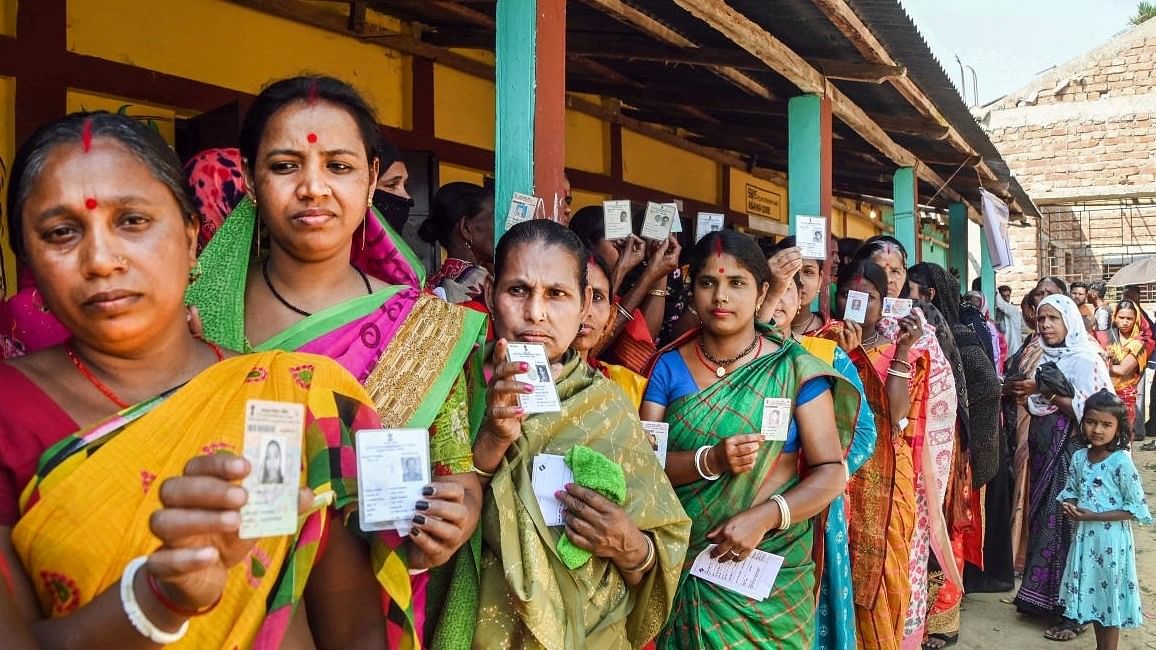
Representative image of election.
Credit: PTI Photo
Bhopal: The Vindhya region of Madhya Pradesh, which has 30 Assembly seats out of a total of 230, could once again prove decisive in determining the final tally in the November polls, with both BJP and Congress finalising their candidates as the election enters the last lap.
The Vindhya region comprises seven districts — Rewa (8 seats), Satna (7), Sidhi (4), Shahdol (3), Anuppur (3), Singrauli (3) and Umaria (2).
The region has remained a saffron bastion since 2003, with the Congress only reaching the double-digit threshold in 2013 by winning 11 of 30 seats there.
In the 2018 Assembly elections, the Congress slid back, winning only six as against the BJP’s win of 24 seats in the region. The spectacular performance here kept the BJP in contention till Jyotiraditya Scindia rebelled to topple the Kamal Nath government in 2019.
But the BJP’s so-called dominance was challenged last year when it lost the mayoral polls to AAP’s Rani Agrawal (party state president) from Singrauli.
The parties face a complex caste equation that became volatile after a urinating incident a few months back. People in the region will bear in mind the infamous incident when a privileged caste member urinated on a Dalit in Sidhi district. The Gond Tribal agitation in Shahdol is also fresh in voters’ mind.
A few BJP workers and a distant relative of MLA, Kedar Shukla, were purportedly behind the urination incident, sparking a nationwide outrage. Later, Chief Minister Shivraj Singh Chouhan had resorted to high-pitch theatrics as a damage-control exercise, which, however, did not go down well with the upper castes.
Without making reference to any particular incident, Union Home Minister Amit Shah had directed state leaders not to be so defensive about such acts in a politically charged atmosphere. Of course, it was apparent that Shah was referring to Chouhan’s actions.
Following the controversy, the BJP decided to field MP (Sidhi) Riti Pathak as the party nominee in place of Kedar Shukla, who has quit the party and has decided to contest as an Independent.
In the light of the unsavoury incident, the Congress also finds itself in a piquant situation, after its new leader Narayan Tripathi, a BJP defector from Maihar, is seen as a prominent Brahmin face in the party.
The BSP and Samajwadi Party also have a presence in the region due to its proximity to Uttar Pradesh. However, their share of votes is modest. Meanwhile, I.N.D.I.A bloc party SP, which was hoping to get six to seven odd seats from the Congress kitty, has now decided to go solo after failed negotiations. Sources said SP has fielded 11 in the region from a total of 31 tickets to party candidates.
The BJP is also dealing with an internal quandary in the form of Narayan Tripathi of Maihar, who left the party after being denied a ticket. Tripathi was the chief architect in the formation of the Maihar district. According to reports, the Rajputs and Brahmins are resentful of the saffron party’s preferential treatment to the OBCs. MP Ganesh Singh (OBC) has been fielded from Satna — the city seat duly dominated by Rajputs and Brahmins.
On the other hand, the Congress has its own challenges to deal with in order to bounce back amid anti-incumbency and dissent against the BJP. Heavyweights like Ajay Singh (Rahul Bhaiyya), in the fray from home turf Churhat against Shardentu Tiwari of the BJP, won’t leave any chance of man-to-man marking in pockets.
The grand old party is also facing rebellion, infighting and a vote split among smaller parties such as AAP, SP, and BSP